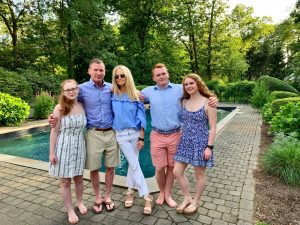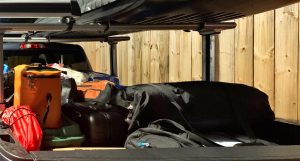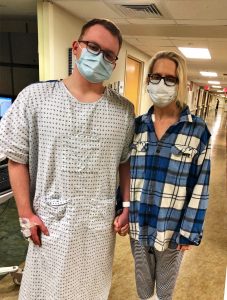By Stephen Roney
I was 10 hours into a 30-hour drive from Connecticut to San Antonio when my cell phone rang. It was Dr. David Gerber from UNC Health. “Stephen, I know you and your family have been through a lot and I am not looking to add to your angst, but I think we can help you here in Chapel Hill.”
I did not hesitate. “David, we will be there by midnight.”
—
My wife, Margie, was diagnosed with Sjogren’s syndrome, an auto-immune disease, in 2001. Sjogren’s affects the salivary glands, making it difficult to produce saliva, and can also cause dry, burning eyes. In some cases, like Margie’s, the kidneys are impacted. There is no cure for Sjogren’s, and symptoms are treated on a bespoke basis. We were told that eventually Margie’s kidneys would fail, and she would need a transplant. This seemed a long way off to us, so we never worried much about it.
In 2007, Margie’s blood creatinine rose to a level that indicated significant kidney dysfunction. We were shown kidneys at Yale New Haven Hospital and were close to conducting the transplant there, but just prior to surgery we were given other advice that the transplant might not be the best option at that moment. As you can imagine, as a non-medical professional I was confused.
A friend of mine attended college with UNC Health’s Dr. David Gerber and reached out to him to ask if he might speak with me. Dr. Gerber agreed and explained to me the pros and cons of all of our options. I could tell that he was knowledgeable, honest and caring. This was not the last time that he would make himself available to my family to help us navigate chronic kidney disease. 
—
We decided to hold off on the transplant. Margie was given medications and we adjusted her diet and increased her fluid intake. Her kidney function improved so much that we were placed on the “inactive waiting list” for cadaver kidneys.
Despite the improvement, I prepared for any potential setbacks. I would reach out to Dr. Gerber from time to time to ask him about cadaver kidneys versus living donor transplants, about kidney exchange programs, about blood type desensitization – the list goes on. He would always respond immediately from wherever he was to help. He even stepped out of a conference in Boston to answer one of my calls. Over the last 13 years, Dr. Gerber has become a trusted advisor – I recall saying at one point that I wish that he could perform the eventual transplant on Margie.
In the summer of 2019, Margie’s health declined precipitously and her kidney function dropped off a cliff. We admitted her to NYU Langone Hospital in the beginning of September. Her blood creatine was dangerously high, her sodium was dangerously low and her blood pressure was through the roof. The teams at NYU spent a month stabilizing Margie. It was clear to me that we were out of runway, and I committed myself to finally get Margie transplanted.
—
One of the hardest parts of the transplant process was asking friends and family to consider donation. I am blood type B+ while Margie is A-, and I knew that my son, Scott, was A-. Even though he is an adult now – 19 years old – I never wanted him on the operating table and hoped that there might be another solution. We had several friends come forward to help, but Scott was clearly the best option. He never blinked. Having grown up with a mother who was constantly in doctor’s offices, he was ready to do something that would push back on this disease. I cannot describe my gratitude and pride.
Having Margie cleared for surgery and getting Scott through the extensive physical and psychological screening took time. November slipped to December which slipped to January and so on. As we checked off tests, COVID-19 became a more prominent news story. We never dreamed that it would impact our timeline.
Margie and Scott were finally cleared for transplant at NYU and the surgery was scheduled for March 23, 2020. As we approached this date, COVID-19 was peaking in New York. NYU called me on March 16 and explained that the virus had reached the hospital – and the transplant floor. However, the physicians still believed that we should proceed with the transplant.
When we arrived at NYU, the hospital was like a war zone. This was not the hospital where we had spent the month of September – it was a hospital was under siege with COVID-19. We received a call from NYU the next day. The operation was canceled. My heart broke.
I reached out to every hospital I could and spoke with every doctor I could. No one was performing living donor transplants anywhere. It was clear to me, however, that Margie would stand a better chance with a new kidney than being exposed to this virus in a dialysis center. I reached out to Dr. Gerber and I could tell that he wanted to help. He explained that North Carolina was monitoring the situation in the Northeast and that the state was preparing for its own COVID-19 peak, but he said he would see what he could do.
In the meantime, I finally found a center in San Antonio that was still performing living donor transplants. But I knew I could not fly the family there for risk of exposure to the virus and having to quarantine. Our family had been in isolation for two months and had seen no one. I had, in my hand, test results that showed that my family was COVID-free and I was determined to keep us that way.
We loaded my pickup truck with food, sleeping bags and clothes and we started the 30-hour journey. I had not pulled a 30-hour road trip since college, but my adrenaline was so high I knew I could not sleep.
 When we were gassing up in southern Virginia, Dr. Gerber called. He told me that he had spoken with the administration at UNC Health and that they felt that they could help me. The trust and faith that I have in Dr. Gerber cannot be measured. This call was the first good piece of news that I had received in a long time. In the darkest hour of my life, there was a glimpse of dawn. We reprogrammed the GPS and headed for Chapel Hill.
When we were gassing up in southern Virginia, Dr. Gerber called. He told me that he had spoken with the administration at UNC Health and that they felt that they could help me. The trust and faith that I have in Dr. Gerber cannot be measured. This call was the first good piece of news that I had received in a long time. In the darkest hour of my life, there was a glimpse of dawn. We reprogrammed the GPS and headed for Chapel Hill.
—
When we arrived, it was pouring rain. It was midnight and we were exhausted. I did not take my family to a hotel. Again, I did not want my family exposed and I did not want to wait through quarantine. I found a church parking lot and we slept in the car for the night before finding a rental property in Durham that had not been occupied for several weeks.
UNC Health defined efficiency. They quickly scheduled my wife and son for preoperative screening. They linked to the systems at NYU and began downloading massive amounts of case history on my wife and son. They spoke with the teams at NYU and quickly came up to speed on our situation. We met with the surgeon, Dr. Alex Toledo, and other members of the transplant team. I was overwhelmed with the attention that we were receiving.
Then the other shoe dropped.
On March 30, Dr. Randy Detwiler, one of UNC Health’s nephrologists, called. He explained that UNC Health had uncovered an issue with my wife’s mitral valve and that her cardiac function was not sufficient to clear her for surgery. UNC Health wanted to admit my wife and perform a cardiac catheterization. He wanted us to meet with Dr. Joseph Sivac, UNC’s transplant cardiologist.
I did not understand. We had been cleared for surgery at NYU and we would have performed that surgery if it had not been for the coronavirus. My head was spinning. Dr. Detwiler is a great doctor, but if God had a line for granting patience, I never got in it.
We met with Dr. Sivac the following day. I was not happy, but I was determined to be unemotional and to make my case to simply proceed to transplant. When Dr. Sivac came in the room, everything changed. He listened to me without saying anything. I asked him if it would be ok for me to patch in Dr. Seidelmann from Connecticut so they could consult while we were in the room. Everything he said made sense and I was very grateful for his willingness to speak with our doctor in Connecticut in our presence. Most importantly, he said this:
“If we find something wrong with Margie’s heart, we will fix it, then we will proceed to transplant.”
Margie was admitted and underwent dialysis. Throughout this process, Dr. Detwiler gave me constant updates. I realized that his caution was warranted. UNC Health is careful, premediated and efficient, and they very carefully remove as much uncertainty as possible. Margie was also treated by Dr. Eddie Fuller, another nephrologist, who provided care above and beyond the call of duty. I was not able to see Margie while she was in the hospital for that two-week period, but I was secure in the knowledge that she was well cared for. After two weeks, Margie was cleared for surgery.
—
At 4:30 a.m. on April 14, I drove my son to the hospital. Beginning with his IV and throughout the process, doctors and nurses came in and explained everything that they were doing. Eventually, my wife was able to come in. We had not seen her for two weeks. My son and wife held hands and I fought back tears. Finally, they took my son into the OR. I was then able to spend time with my wife in her pre-operative area. The doctors explained to me that the surgery is choreographed and timed so that my wife is prepared to receive the kidney from my son with maximum efficiency. They then took my wife to the OR.
I thought I was alone. On the board in the waiting room, I could see the progress of the operation unfold. I immediately began to receive texts and updates on my wife and son’s progress. I never went more than 45 minutes over the six-hour operation without a text or phone call from transplant coordinators. Surgeons came out to speak with me periodically.
receive texts and updates on my wife and son’s progress. I never went more than 45 minutes over the six-hour operation without a text or phone call from transplant coordinators. Surgeons came out to speak with me periodically.
I was never alone.
When you watch your wife and son rolled into operating rooms at the same time, you cannot possibly feel more helpless, and UNC Health was there to help every step of the way.
Post-transplant, I accompanied my son to his room. The care he received was exceptional. I was allowed to stay with him the first night, which also allowed me to visit my wife briefly. The morning after surgery, her blood creatine was 0.6, down from dangerously high levels. I was ecstatic.
Margie and Scott stayed in the hospital for three days before I was able to bring them back to our rental to recover. The post-operative care was amazing. Margie had blood drawn regularly and nurses would go over her medications almost daily. I wish that I could detail every person that cared for us – everyone was exceptional. I have no idea how UNC Health attracts its talent, but they should patent the algorithm – they have created something truly special in Chapel Hill.
—
Through the whole process, I had never actually met Dr. Gerber. I could not meet with him at UNC Health because of coronavirus visitation restrictions. We spoke on the phone, emailed and texted. He had stopped by to meet my wife, but he had recused himself from the screening and care of my family. I believe he did this so that the doctors and staff at UNC Health would feel comfortable making decisions independent of the friendship that I have developed with David over the years.=
With my wife and son discharged, I was determined to meet with David before we headed home. I tried to schedule time to meet but my job kept interfering. I finally asked if he would be okay with meeting on a weekend. I felt horrible imposing as this man does so much to help people and he deserves his down time. Still, I was selfish. I needed to thank him.
He met me on a beautiful Sunday at the Bell Tower. This was not a 5-minute thank you. He dropped everything and took me for a socially distanced tour of the beautiful Chapel Hill campus. Seriously, who does this? David Gerber does. All of the doctors, nurses and staff at UNC Health do. This is what they do.
I am forever in your debt, UNC Health.
Some people talk about values – other live them:
UNC Health Values:
Innovation: We strive for continuous improvement through integration of education, discovery, and patient care.
Compassion: We demonstrate concern and compassion for our patients and their families, treating each person with dignity and respect throughout their care.
Accountability: We steward our resources wisely with the goal of enhancing quality and value.
Excellence: We strive to be the best we can be and to exceed expectations in everything we do.
Collaboration: We believe in working collaboratively within our department, as well as with professionals in the health care system, university, state and world.
Patient-Centered: We put the patient at the center of everything we do.
To learn more about UNC Health transplant care, click here. To make a gift to support transplant care and research, click here.

4 Responses to ““Something Truly Special”: The Roney Family Story”
dennis m redoblado
KUDOS TO UNC HEALTHCARE HEALTH VALUES….
Mimi
This is an amazing story Dr David Gerber is my uncle ! I swear
Lisa Barron
Wow.
I knew what was going on and the March 23 date and then you ended up in NC but I never knew it to this extent.
What a story Stephen and what a good outcome.
I just sent it to Ken and then Wanda.
Margie is so lucky to have one amazing family. Xoxo
Nik Money
Scott is a student in one of my classes at Miami University. This is a really inspiring story.